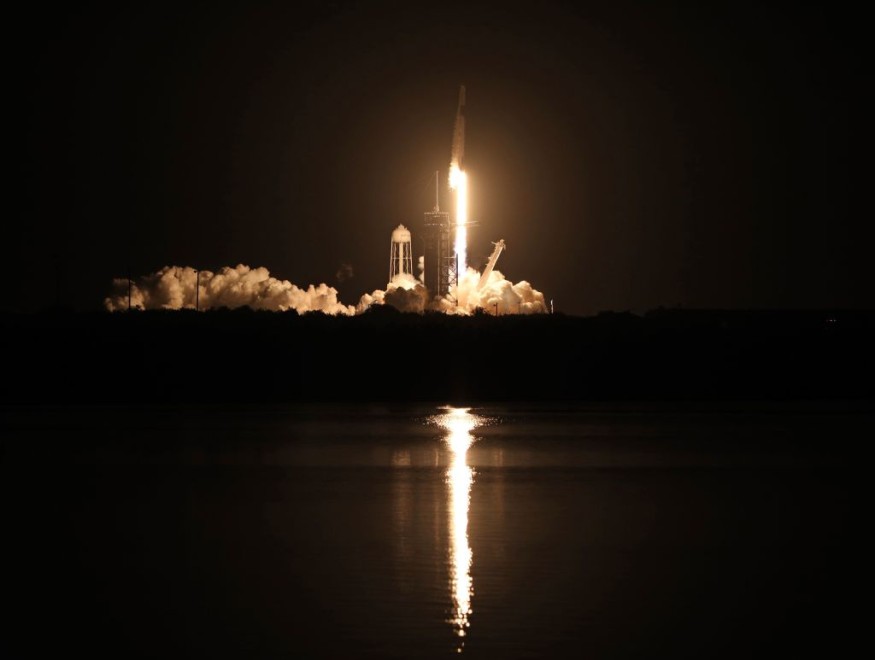Astranis, a San Francisco-based startup, has purchased a dedicated launch on a SpaceX Falcon 9 rocket, foregoing the less expensive "ride-share" model favored by new space companies for an exclusive mission that will bring its package of four communications satellites closer to their target geostationary (GEO) orbit in a much shorter amount of time, according to Astranis.
Astranis had originally intended to launch the tiny 400-kilogram satellite atop SpaceX's Falcon 9, but the firm had a change of heart and revealed that it will launch it as a secondary payload on a powerful Falcon Heavy rocket in Spring 2022.

A SpaceX Falcon 9 rocket lifts off from launch complex 39A at the Kennedy Space Center in Florida on November 15, 2020.
Astranis Picks SpaceX Falcon 9 Instead of Falcon Heavy For Launch
According to Astranis, they chose a different launch vehicle since Falcon Heavy would be able to place the communications satellite in geostationary orbit directly.
The mission profile eliminates a multi-month orbit increase requirement from a highly elliptical geostationary transfer orbit (GTO), allowing the spacecraft to reach its orbital slot within days after launch.
"Buying an entire dedicated launch is a huge de-risker for us," John Gedmark, CEO and co-founder, Astranis, said in a statement from Business Wire.
"We're able to control our own destiny here, from a scheduling standpoint. We're also getting an impressive amount of extra performance, getting us closer to our intended orbit and delivering service to our customers much sooner."
ALSO READ : SpaceX Falcon 9 Rocket Launch Bringing 4 Astronauts to ISS Moves To Friday; How to Watch Live
Astranis First Satellite Launch
Next summer, Arcturus, Astranis' first satellite, will be launched on a SpaceX Falcon Heavy ride-share mission. The capacity on that satellite will be licensed solely to Alaskan satellite middle-mile operator Pacific Dataport Inc. when it launches later this year. Astranis claims it will increase Alaska's present satellite capacity while also making internet more affordable and dependable.
TechCrunch said the four satellites that will be launched on the Falcon 9 next summer will also have dedicated customers — one will provide broadband internet access to rural Peru in a $90 million deal with Latin American telecom company Grupo Andesat, and the other two will be leased to Anuvu. The company provides internet connectivity on airplanes and cruise ships. The bandwidth from the fourth satellite will be leased to a separate client who has yet to be revealed. The four satellites set to launch next summer will have a variety of technological modifications, including improvements to the radio payload and propulsion system, which will prolong the spacecraft's lifespan.
As these transactions demonstrate, Astranis' economic strategy differs from other communications satellite providers. Rather than selling directly to customers (like Starlink did), the corporation rents bandwidth to communications providers, selling internet access to consumers.
Astranis' Objective
The Astranis MicroGEO satellite platform has been upgraded on the four new spacecraft. Throughput has been raised, mission lifespan has been prolonged, and redundancy has been increased. The four spacecraft will be mounted to a conventional adapter ring known as an ESPA-Grande for simplicity of deployment.
According to a Bloomberg story, Astranis' objective per Gedmark has always been to refine the design while growing manufacturing to dozens of satellites are built and launched into space every year.
By 2030, more than 100 Astranis satellites will be in operation, providing truly low-cost broadband internet access to millions of people in underserved places worldwide.
Traditional GEO communications satellites are 1/20th the size and expense of Astranis MicroGEO satellites. Astranis offers dedicated satellite bandwidth at a cheaper cost and with significantly quicker construction times, allowing users to connect to the internet wherever and whenever they need it.
RELATED ARTICLE : SpaceX Falcon 9 Rocket Launches 40 Low-Cost Transporter-4 Satellites From Cape Canaveral Air Force Station
Check out more news and information on SpaceX in Science Times.
© 2026 ScienceTimes.com All rights reserved. Do not reproduce without permission. The window to the world of Science Times.











